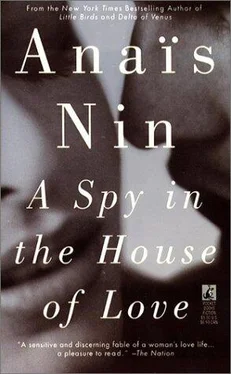When he was ready, before he gathered up his shoes, he bent over her, and in the voice of a tender young man playing at being a father he said: “Would you like me to tuck you in before I leave?”
“Yes, yes,” said Sabina, her distress melting. “Yes,” she said, with gratitude not for the gesture of protectiveness, but because if he considered her bad in his own vision, he would not have tucked her in. One does not tuck in a bad woman. And surely this gesture meant that perhaps he would see her again.
He tucked her in gently and with all the neatness of a flyer’s training, using the deftness of long experience with camping. She lay back accepting this, but what he tucked in so gently was not a night of pleasure, a body satiated, but a body in which he had injected the poison which was killing him, the madness of hunger, guilt and death by proxy which tormented him. He had injected into her body his own venomous guilt for living and desiring. He had mingled poison with every drop of pleasure, a drop of poison in every kiss, every thrust of sensual pleasure the thrust of a knife killing what he desired, killing with guilt.
The following day Alan arrived, his equable smile and equable temper unchanged. His vision of Sabina unchanged. Sabina had hoped he would exorcise the obsession which had enslaved her the night before, but he was too removed from her chaotic despair, and his extended hand, his extended love was unequal to the power of what was dragging her down.
The sharp, the intense moment of pleasure which had taken possession of her body, and the sharp intense poison amalgamated with it.
She wanted to rescue John from a distortion she knew led to madness. She wanted to prove to him that his guilt was a distortion, that his vision of her and desire as bad, and of his hunger as bad, was a sickness.
The panic, the hunger and terror of his eyes had passed into her. She wished she had never looked into his eyes. She felt a desperate need to abolish his guilt, the need of rescuing him because for a reason she could not fathom, she had sunk with him into the guilt; she had to rescue him and herself. He had poisoned her, transmitted his doom to her. She would go mad with him if she did not rescue him and alter his vision.
If he had not tucked her in she might have rebelled against him, hated him, hated his blindness. But this act of tenderness had abolished all defenses: he was blind in error, frightened and tender, cruel and lost, and she was all these with him, by him, through himt>
She could not even mock at his obsession with flying. His airplanes were not different from her relationships, by which she sought other lands, strange faces, forgetfulness, the unfamiliar, the fantasy and the fairy tale.
She could not mock his rebellion against being grounded. She understood it, experienced it each time that, wounded, she flew back to Alan. If only he had not tucked her in, not as a bad woman, but as the child, the child he was in a terrifying, confusing world. If only he had left brutally, projecting his shame on her as so often woman bore the brunt of man’s shame, shame thrown at her in place of stones, for seducing and tempting. Then she could have hated him, and forgotten him, but because he had tucked her in, he would come back. He had not thrown his shame at her, he had not said: “You’re bad.” One does not tuck in a bad woman.
But when they met accidentally, and he saw her walking beside Alan, at this moment, in the glance he threw at her, Sabina saw that he had succeeded in shifting the shame and that now what he felt was: “ You’re a bad woman,” and that he would never come back to her. Only the poison remained, without hope of the counter-poison.
Alan left, and Sabina stayed with the hope of seeing John again. She sought him vainly at bars, restaurants, movie houses and at the beach. She inquired at the place where he rented his bicycle: they had not seen him but he still had his bicycle.
In desperation she inquired at the house where he rented a room. The room was paid for the next week, but he had not been there for three days and the woman was concerned because John’s father had been telephoning every day.
The last time he had been seen was at the bar, with a group of strangers who had driven away with him.
Sabina felt she should return to New York and forget him, but his eager face and the distress in his eyes made this act seem one of desertion.
At other moments the pleasure he had given her ignited her body like flowing warm mercury darting through the veins. The memory of it flowed through the waves when she swam, and the waves seemed like his hands, or the form of his body in her hands.
She fled from the waves and his hands. But when she lay on the warm sand, it was his body again on which she lay; it was his dry skin and his swift elusive movements slipping through her fingers, shifting beneath her breasts. She fled from the sand of his caresses.
But when she bicycled home, she was racing him, she heard his merry challenges, faster—faster—faster in the wind, his face pursued her in flight or she pursued his face.
That night she raised her face to the moon, and the gesture awakened the pain, because to receive his kiss she had had to raise her face this way, but with the support of his two hands. Her mouth opened to receive his kiss once more but closed on emptiness. She almost shouted out with pain, shouted at the moon,the deaf, impassible goddess of desire shining down mockingly at an empty night, an empty bed.
She decided to pass once more by his house, although it was late, although she dreaded to see once more the empty dead face of his window.
His window was alight and open!
Sabina stood under it and whispered his name. She was hidden by a bush. She dreaded that anyone else in the house should hear her. She dreaded the eyes of the world upon a woman standing under a young man’s window.
“John! John!”
He leaned out of the window, his hair tousled, and even in the moonlight she could see his face was burning and his eyes hazy.
“Who’s there?” he said, always with the tone of a man at war, fearing ambush.
“Sabina. I just wanted to know… Are you all right?”
“Of course I’m all right. I was in the hospital.”
“The hospital?”
“A bout of malaria, that’s all.”
“Malaria?”
“I get it, when I drink too much…”
“Will I see you tomorrow?”
He laughed softly: “My father is coming to stay with me.”
“We won’t be able to see each other then. I’d better return to New York.”
“I’ll call you when I get back.”
“Will you come down and kiss me goodnight?”
He hesitated: “They will hear me. They will tell my father.”
“Goodbye, goodnight…”
“Goodbye,” he said, detached, cheerful.
But she could not leave Long Island. It was as if he had thrown a net around her by the pleasure she wanted again, by his creation of a Sabina she wanted to erase, by a poison he alone had the cure for, of a mutual guilt which only an act of love could transmute into something else than a one-night encounter with a stranger.
The moon mocked her as she walked back to her empty bed. The moon’s wide grin which Sabina had never noticed before, never before its mockery of this quest of love which she influenced. I understand his madness, why does he run away from me? I feel close to him, why does he not feel close to me, why doesn’t he see the resemblance between us, between our madness. I want the impossible, I want to fly all the t, I destroy ordinary life, I run towards all the dangers of love as he ran towards all the dangers of war. He runs away, war is less terrifying to him than life…
John and the moon left this madness unexorcised. No trace of it was revealed except when she was taunted:
Читать дальше












